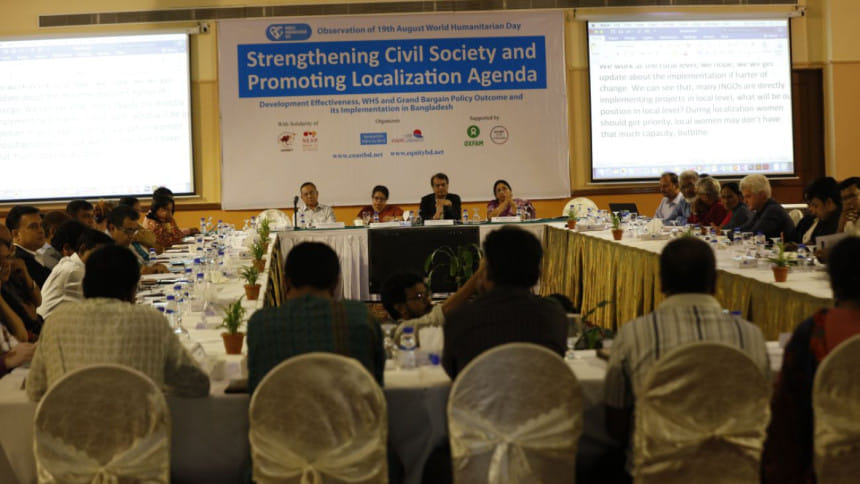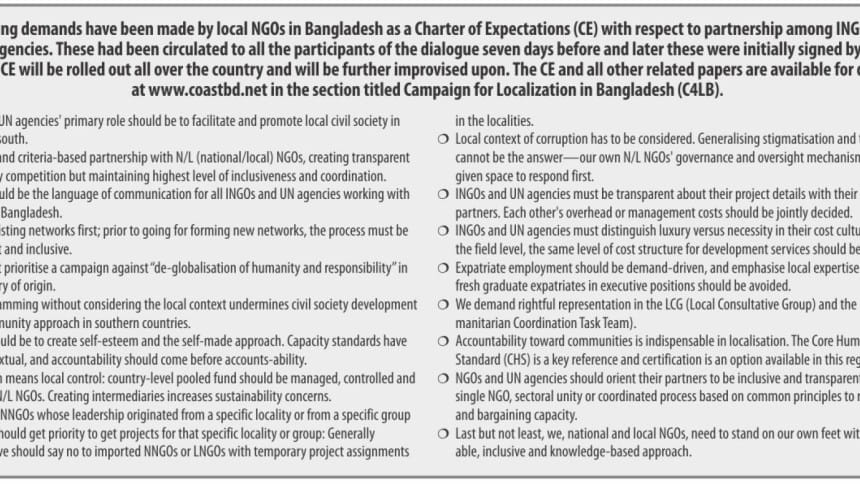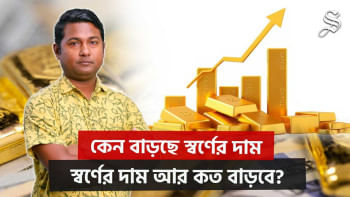Strengthening Civil Society and Promoting Localisation Agenda

On August 19, 2017 Bangladeshi NGOs for WHS and COAST(Coastal Association for Social Transformation Trust) Bangladesh in cooperation with Oxfam International organised a public dialogue on “Strengthening Civil Society and Promoting Localisation Agenda: Development Effectiveness (DE), WHS and Grand Bargain (GB) Policy Outcomes and its Implementation in Bangladesh” in observation of the World Humanitarian Day 2017 at Lakeshore Hotel, Dhaka. Oxfam in Bangladesh and Start Fund Bangladesh supported in organising the seminar with the solidarity of ADRRN (Asian Disaster Risk Reduction Network) and NEAR (Network for Empowering Aid Response). Here we publish a summary of the discussions.
Rezaul Karim Chowdhury, Executive Director of COAST Trust and Coordinator of Bangladesh NGOs for World Humanitarian Summit (BNW) and moderator of the session: The organisers' group in the last four months has translated and prepared brief papers on DE, WHS and GB policy outcomes and discussed the implications in Bangladesh, especially with respect to partnership relations with Bangladeshi NGOs (non-government organisations) or civil society with INGOs (international NGOs), donors and UN (United Nations) agencies. The group has developed the Charter of Expectations (CE) both in English and Bangla through a participatory way within BNW which has been sent out to all the dialogue participants in the last seven days. I request the participants to focus on the expectations agenda during their deliberations. Bangladesh is known for its vibrant civil society with respect to development, so along with the state and market as a third sector, sovereign, accountable and sustainable growth is needed, where the DE, WHS and GB outcomes' major thrust on “localisation” gave new dynamics. This is the first event prior to go for a country wide campaign and we are planning a convention at later part of the year with the feedback and its culmination.
Rasheda K Choudhury, Advisor to the Former Care Taker Government, Executive Director, CAMPE and Chair of the dialogue: I am pleased to take part in this programme graced by all the major development partners and stakeholders including government representatives and NGOs. One cannot imagine the sufferings young girls and women come across in flood-affected areas. To pave the path for visible change, we feel the urgency of strengthening the civil society in Bangladesh as well as the whole world. We also feel the need for promoting a localisation agenda. But a big question mark hangs over how the global agenda can be translated into the local context. Three Cs are crucial: context, capacity and commitment. What's the context, or to be precise, the local context? Where is the capacity to deliver from the government's end, civil society's end or that of other stakeholders?
Shawkat Ali Tutul, Assistant Director- Social Accountability and Disaster Risk Reduction , COAST as keynote speaker: Since 2008, humanitarian partners have been observing the day to pay tribute to those who risked their lives for humanitarian assistance. On the occasion of the day this year, we have poised ourselves to strengthen the civil society and promote a localisation agenda. As part of promoting this agenda, we recommend that the local NGOs operating in a particular area are prioritised when projects related to that specific locality are being handed out. Our commitment and strategies align on mainly three international policies: development effectiveness, world humanitarian summit and grand bargain policy. Development effectiveness is basically a partnership among the government, civil society, donors and other stakeholders for effective development, especially in the third world countries. We have proposed a host of demands in the form of the Charter of Expectations from INGOs, donors and UN agencies for equitable and dignified partnership.
Shova Rani Mandol, Executive Director, SASUS: I can tell you the story of a woman, raised in a remote area, desperately trying to provide humanitarian assistances to those in need but ending up being a victim of gender discrimination, communal discrimination, and above all, facing false allegations. People like us who run local NGOs are the ones who need the funding and assistance most. You know we don't receive bank loans without mortgage. If we don't receive funding, we will be uprooted like a plant in times of flood.
Rafiqul Islam, Executive Director, Dwip Unnayan Procesta (DUS): Following liberation, Bangladesh was greatly in need of relief. But now, in Bangladesh's transition from relief to development—we are in a state where we do not need much relief—lies contribution from local NGOs. People like Shova Rani made a difference. They worked voluntarily and ran their organisations. The time has come for development partners to collaborate with local NGOs. You know climate change is leading to innumerable issues like abrupt rainfall, inundation and food crisis. If today a calamity hits the coastal area and washes away tens of thousands of people or riverbank erosion renders them homeless, should we expect international organisations to come forward and salvage us? Therefore, the solution has to come from within.
AHM Bazlur Rahaman, Chief Executive Officer, Bangladesh NGOs Network for Radio and Communication (BNNRC): I fully agree with the policy outcomes and Bangladeshi NGOs' expectations in view of the policy outcomes of WHS, GB and DE. I have observed the urgency of bridging the gap between INGOs and local NGOs, which would be tantamount to achieving part of the sustainable development goals. I believe that we should immediately make an action plan on these and implement them without further delay. We should also arrange yearly review programmes on how much we have progressed in terms of this.
AM Nasir Uddin, Manager -Disaster Risk Reduction, Action Aid Bangladesh: It is a sad fact that the hurdles women change-makers used to face 40 years back are the same as the ones they are facing even today. They are still encountering the same issues like social stigma while working on their own ideas or coming up with an NGO. Though our Constitution dictates equality at all levels, we are yet to get there. We have envisioned transforming ourselves into a middle-income nation by 2021 and a developed nation by 2041. If we don't communicate the message to the local actors, it will be hard for us to make any significant change.
Foyezullah Chowdhury, Executive Director, Borendra Prochesta: The capacity, vision and transparency of NGOs are not always beyond question. Sometimes the donor organisations are doubtful about whether or not the NGO they are going to fund will be able to serve the cause rightfully. That doesn't necessarily mean that all NGOs are incapable or lack transparency; it is also a question about who or in what context the capacity is defined. There should be a clearly defined method to find out which local NGOs lack in which way. Their lacking has to be overcome and their strength intensified.
Asaduzzaman Shiekh, Executive Director, Udayan Bangladesh: In the aftermath of cyclone Sidr, the super-cyclone that killed 11 of my relatives, we, local NGOs, started reaching out to people on our own. We approached donor agencies. They were a little doubtful about our capacity since we lacked any formal identity like that of a registered organisation. However, donor agencies later involved us in their project. They may get their job done and leave the region but we will never cease to work in the coastal areas.
Sumon Islam, Academy Centre Director, Humanitarian Leadership Academy: If we estimate that the top five percent of people have USD 10,000 income per capita, and many of them are willing to help people, or if we observe that a British man is eager to help our people through a trusted international organisation, I must ask whether or not our people entrust local NGOs with the same task. The challenge is how the money pumped in by local benevolent people can be mobilised through local NGOs. I also recommend that a proper certification system be introduced based on the transparency, strength and experiences a particular local NGO possesses.
Momtaz Khatun, Executive Director, Ashroy Foundation: INGOs often have a tendency to directly reach out to people instead of partnering with local NGOs. I recommend INGOs take part in capacity-building of local NGOs. I also recommend that local women's organisations be prioritised when it comes to offering any project.
Sonjit Leo Gomez, Senior Coordinator-Programmes, Stromme Foundation: As a representative of an INGO, I observed that the local NGOs we partner with understand the cause we work for; but they fail to communicate the message to their employees. This ultimately leads to a sort of communication gap. Another burning issue is transparency, which INGOs give the highest importance to.
Sajid Raihan, Country Manager, Start Fund Bangladesh: When we talk about localisation agenda, its definition should be well-clarified. If local NGOs are endowed with the lion's share of total funding, it will not guarantee their empowerment or automatically translate into the empowerment of the communities. If local NGOs always look for funding from INGOs, the scenario will not change to a great extent. Rather, we recommend that the local NGOs ensure the maximum use of local resources, which would strengthen their capability. Moreover, proper coordination among the government, local NGOs and INGOs should be maintained to bring in visible change.
Shaheen Anam, Executive Director, Manusher Jonno Foundation: People talk about corruption of NGOs, and I would like to ask how one can expect NGOs to be an angel when corruption is endemic in every sphere of society; after all NGOs are also part of this society. Just like not all government officials are corrupt in the same manner, not all NGOs are corrupt; in fact I would say most are not. The positive changes brought about by NGOs in Bangladesh have earned us worldwide recognition and should be appreciated. The job of an NGO is not just providing people with better healthcare, education or other services but to build their capacity and enable them to raise their voice to demand those services as their right and entitlement.
Murshed Alam, Executive Director, POPI: In Bangladesh, we have already observed that a handful of organisations began their journey in a little village but ended up going national or even global. This is a great example to be emulated by others. In reality, local NGOs can run with their own resources but INGOs cannot survive without international funding. So, in terms of capacity, local NGOs can outshine INGOs when it comes to mobilising local resources. Local organisations can implement humanitarian initiatives at the minimal administrative cost.
Edouard Weigbour, Country Representative, UNICEF: Definitely, localisation is the best way to extend humanitarian assistance. To pave the path forward for this, different types of links between the NGOs and the government must be built for providing better services.
Orla Murphy, Country Director, Plan International: We know Bangladesh is transforming. And the role of humanitarian actors is as well. We all feel the urgency of empowering the voice of local communities, the voice of local actors and understanding the impact at the local level. At the same time, there are other voices in a partnership. So we have to hold each other accountable to catalyse the process of building capacity and strength. Each of the actors such as the community, local government, the national government and the donor agencies has to complement the role of the other.
Mark Pierce, Country Director, Save the Children International: I must mention that a child in a disaster-hit area doesn't need any explanation as to where the assistance is coming from. All that matters is the assistance reached out to the child timely and adequately. We all agree to the point that local NGOs have an instrumental role to play when it comes to carrying out humanitarian actions. One thing should be noted: Disasters are particularly more devastating when there is lack of planning or preparedness. So local NGOs have to be strengthened in line with those issues.
Khandakar Rakibur Rahman, Director General of NGO Affairs Bureau, Prime Minister's Office: The government is enthusiastic about promoting small-scale local NGOs by providing them with support including funding. Both local NGOs and NGO Affairs Bureau have to build up their capacity and maintain a close link for providing better services to the countrymen.
Reiza Dejito, Country Director, Handicap International: On the occasion of the World Humanitarian Day, we are talking about inclusion and unity and are mulling over a common platform where we all will stand upon to carry out humanitarian actions together. We have to go back to our roots and deliver on our commitments by resolving all the issues through mutual understanding.
Nipin Gangadharan, Country Director, Action Against Hunger: I don't think there is any tension between INGOs and NGOs. At different times of disasters, we have worked hand in hand for extending humanitarian assistance. In the last two decades, the instrumental role of partnership has become very clear.
Gowhar Nayeem Wahra, Member Secretary of Disaster Forum and Adjunct Faculty Dhaka University: Employees of small organisations are not adequately paid. Another thing is that these organisations lack access to funding. This is a burning issue we have been dealing with over the last three decades but haven't been able to resolve yet. Local NGOs are being washed away like objects in the face of floodwater. I don't necessarily agree to the point that local NGOs lack capacity. In Istanbul, we talked about GB. But, we haven't figured out how it can be translated into the local context. We must face the question as to whether we are partnering with local organisations on the grounds of low payment or working with them for strengthening their capacity. It's a basic moral question. I believe that a close relationship “based on dignity” has to be maintained between local NGOs, INGOs and donor agencies for serving the people better.
MB Akhter, Program Director, Oxfam International: We need a locally accepted and designed pathway for the localisation campaign. What are the asks of this Charter for Change and how does it fit with Bangladesh? We need to find out at least five short- and long-term asks that actually create an environment which facilitates the localisation. I am sure if local CSOs find the asks interesting, they will join and support the localisation process.
AKM Jashim Uddin, Director, Association of Development Agencies Bangladesh (ADAB): There are several studies that concluded that if INGOs and donors invest money in local NGOs and do the project with them, then results turn out to be sustained and transaction costs become less.
Md. Arifur Rahman, Chief Executive, Young Power in Social Action (YPSA): INGOs and donors most of the time create new networks as a part of their project achievements, but later on the networks hardly sustain. So, we urge the INGOs and donors to try first with the existing networks, make the efforts transparent, inclusive and participatory, rather than creating unnecessary tensions within the wider NGO sector.
Anwar Zahid, Executive Director, Integrated Community Development Association (ICDA): Sometimes donors and INGOs do projects of the same nature both directly and through partnership, but in both respect they maintain different levels of salary and benefits–especially when it's direct, they give high salary and input to show better results, thus creating bad results, but blame outcomes on the poor local NGO partners. It is unfair.
Rafiqul Islam, Executive Director, Rupantor: Using the local language should be the prime concern with respect to localisation. All the INGOs and donors have highly professional local staff who can easily introduce local language for inviting submission of project proposals and communication with local partners. It is not fair to introduce English, even at the field level, only for one or two foreigners.


 For all latest news, follow The Daily Star's Google News channel.
For all latest news, follow The Daily Star's Google News channel. 



Comments